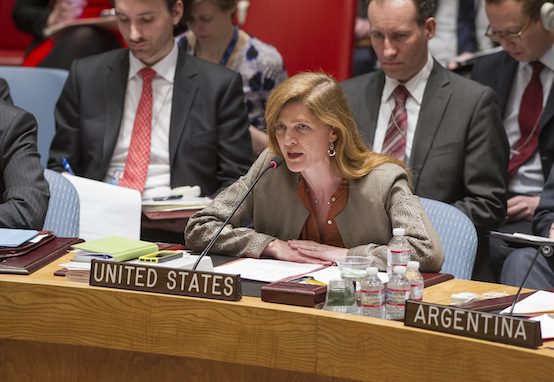Power’s Pathetic Libyan War Excuse

Dexter Filkins reviews Samantha Power’s memoir, and like Daniel Bessner he finds that she doesn’t have much to say about the consequences of the “humanitarian” interventions she supported. He cites one line from her book that is unfortunately all too typical of arrogant interventionists:
Power essentially absolves herself and the Administration of what happened after the bombs: “We could hardly expect to have a crystal ball when it came to accurately predicting outcomes in places where the culture was not our own.”
As Filkins notes, “this sounds like an argument for not intervening at all,” but in this case it is a pathetic attempt by Power to deny responsibility for the effects of a war she backed by shrugging her shoulders and pleading ignorance. If Libyan culture was so opaque and hard for the Obama administration to understand, they should never have taken sides in an internal conflict there. If the “culture was not our own” and they couldn’t anticipate what was going to happen because of that, how arrogant must the policymakers who argued in favor of intervention have been?
Power’s dodge isn’t credible for another obvious reason: lots of people with only a limited understanding of Libyan politics foresaw correctly that a military intervention would produce more instability and violence because that is what military interventions are almost guaranteed to produce in every country. There was no need for a “crystal ball.” All that was needed was some basic understanding of what happens to a country full of militias when the government is overthrown by force. Any country, regardless of culture, would have been thrown into chaos when outside governments helped an armed rebellion collapse the existing state, and it was obvious this would happen in Libya as a result of regime change there.
There is something funny about Power’s attempt to use a foreign culture as an excuse for the poor results of her preferred policy, and by funny I mean infuriating. Interventionists are quick to dismiss objections from their opponents when the latter suggest that our poor understanding of another country’s history and culture make us extremely ill-suited to interfering in their political and military quarrels. When non-interventionists call attention to our ignorance about other parts of the world and the perils of trying to “shape” the politics of countries we don’t understand, interventionists wave away such problems as irrelevant and ridicule references to culture as prejudiced. When it becomes useful to hide behind that same ignorance after an intervention goes awry, Power is only too happy to invoke cultural difference as her alibi. This is a “heads I win, tails you lose” position where the local culture frees interventionists from responsibility when their policy produces a worse outcome but they still want credit for their “good” intentions that led to toppling a foreign government and producing the worse outcome. This reminds us that ideological interventionists like Power can’t be trusted with power because they will predictably misuse that power to destabilize other parts of the world, and then they will refuse to learn anything from their mistakes.
The truth is that Libyan war supporters weren’t concerned about what happened later. That would be someone else’s problem. They had had their “good” intervention, and they declared that it had “worked,” and then Libya and its neighbors paid the price for their self-congratulation. To make things worse, within two years of that debacle Power was all too eager to make an even bigger blunder in Syria. One can only guess what other countries she will want to “help” with airstrikes in the future. We have to hope that a future Democratic administration won’t put her in any significant foreign policy position. If there were any accountability in foreign policy, Power would be discredited for a long time to come. Since we know there is no such accountability, we will have to be on guard against the next resurgence of liberal interventionism.